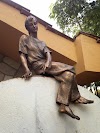Homily at our 2024 Diocesan Pilgrimage
on the Feast of the Assumption of Mary
on the Feast of the Assumption of Mary
"Let us come out, carrying Jesus in us"
Kumbayah
Last month, as the priests went on retreat to Mariannhill, I gave a hand at the Cathedral with the Masses celebrated during the week. One day, after Mass, Sr Alexia asked me if I could go to “Shosholoza” and pray for the children who would be leaving for an outing to Hlane.
I am “their neighbour”, I live across the road and every morning I listen to them singing joyfully. So I decided not only to go and say a prayer but to take my guitar with me and sing with them. The moment they saw the guitar they surrounded me and I had to follow their choice of hymns.
There was one I wanted to sing with them. We all know it: “kumbayah”. This word points to the final words in the Bible (Rev 22:20) where it says: “Come Lord”. That is why, the hymn says: “someone is praying”, “someone is singing”, “someone is crying” … come Lord! Kumbayah!
Preparing myself for this pilgrimage I took time to read your prayers, the ones being written in the book of prayers for our Diocesan Jubilee. Practically in every page we say: “Kumbayah”. We call the Lord to come to us as we are sick, unemployed, hoping for a promotion, for a court case to be resolved...
Come out!
The motto for our Diocesan Jubilee is taken from John 11:43 “Lazarus, come out!”. I would like to take this opportunity to thank you for all the work being done during this Jubilee year. Every Sunday afternoon I read about the many initiatives taking place in our Diocese.
The particular thing of this year is that it is not us calling the Lord to come to us (Kumbayah) but it is the Lord who is asking us “to come out" of our tombs.
In other words, this is not a year like 2019/2020 in which we said: “baptised and sent”. It is different and it is important that all of us see it, understand it and remember it. When he calls Lazarus to “Come out”, Jesus wants him to come out of the tomb! He does so because there is life waiting for him! As far as he remains in the tomb, he will only experience death.
Jubilee Hymn
I am grateful to the one who composed the jubilee hymn because he was able to fully grasped the meaning of this year. The refrain says:
Vuka Lazaro, Vuka! Phuma kulelothuna.
Yamukela imphilo lensha. Vuka! Kufa kuncotjiwe
Wake up Lazarus, Wake up! Get out of this grave.
Embrace the new life. Wake up! Death has been conquered
Wake up Lazarus, Wake up! Get out of this grave.
Embrace the new life. Wake up! Death has been conquered
I call every parish to sing it every Sunday so that it helps us all keep in mind the spirit of this Jubilee year.
Not coming out
I was struck by the news of the pastor who killed his wife in 2016 and that same evening went to preach at a church service.
It should help us reflect and not just point fingers, remembering that “when we point a finger to someone, three fingers are pointing to us”.
In different ways, this happens to us too:
- we might be “coming out” from home to church on a Sunday but, back home, no one is able to see the new life of Christ in us. It is even worse when we ourselves become the source of violence at home;
- We might be praying for the gift of peace in our hearts, families and communities but we might not be ready to welcome the way – Jesus’ way – that leads us to peace;
- we might be expecting everyone to change but not us;
- we might be praying for many things we need in our lives but missing to pray for the main blessing: Jesus himself, the One that the Father bless us with.
I hope you remember the prayer I like: “Lord, make me an instrument of your peace”. Because of the way the prayer is written, I always looked at is as something I must do in someone else’s life: “let me sow love, forgiveness… bring light”.
These days, though, I realized that it is in my own life that I need to do that. “No one can give what he/she does not have” we say. So, how can I offer love, forgiveness, light, faith, joy… unless it is already present in my life?
We have read today the passage of Mary’s visit to Elisabeth. Notice that it follows the one of the “annunciation”. In fact, our youth shared both passages with us today.
Mary leaves Nazareth for “to a town in the hill country of Judah” because she has said “yes” to God’s message and there is now “someone” in her to be shared. The moment she arrives at Zechariah’s home and greets her, both Elisabeth and John the Baptist celebrate the presence of the Lord among them through Mary.
We do not just “come out” and reach out to others.
We first examine our own lives and hearts, in the light of God's Word, and identify the presence of death and darkness. We then welcome Jesus' call to come out and receive his gift of fullness of life.
Then, yes, full of joy we reach out to others, like Mary, carrying Jesus in us.




